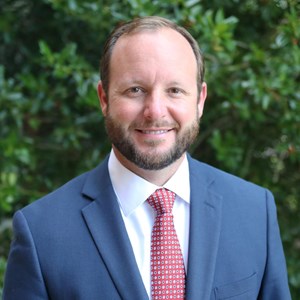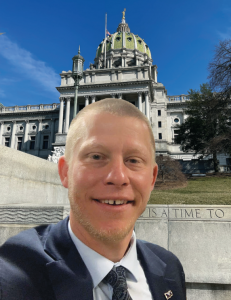 Advance CTE joins the Virginia Department of Education in welcoming Dr. David Eshelman as the new State Career Technical Education (CTE) Director. David has 12 years of experience as a local school division CTE director and has spent the most recent four years at the state agency. He held the role of Director, Workforce Development through the development of the state’s Strengthening Career and Technical Education for the 21st Century Act (Perkins V) State Plan.
Advance CTE joins the Virginia Department of Education in welcoming Dr. David Eshelman as the new State Career Technical Education (CTE) Director. David has 12 years of experience as a local school division CTE director and has spent the most recent four years at the state agency. He held the role of Director, Workforce Development through the development of the state’s Strengthening Career and Technical Education for the 21st Century Act (Perkins V) State Plan.
Advance CTE staff met with David as he shared his pathway to becoming the State Director, as well as his initial priorities for CTE in the Commonwealth of Virginia.
Advance CTE: Which of your professional experiences has most prepared you for your role as the State Director?
David: Although I have held a previous role at the agency prior to becoming the State Director, it was the years spent as a CTE classroom educator and at the administrative level at local comprehensive high schools and career centers that fully equipped me to serve learners and their families now as the State Director. I come to this role with 32 years spent in education, but my state team, among others and myself, are most excited to see how we leverage my experiences spent alongside learners to grow CTE in Virginia.
Advance CTE: What excites you most about being the State Director in Virginia?
David: I am most excited about work underway in Virginia to expand access to work-based learning (WBL) opportunities. As State Director, I am mobilizing funding for a virtual WBL network that complements the Virginia Career Works project and will ensure each learner, no matter what their zip code is, has opportunities for this type of learning. That truly excites me.
Advance CTE: As you are settling into your new position, what initial priorities have you identified?
David: In our state and at the department we have identified a need to build leadership capacity and support our CTE educators who are at the local level and who may even have the aspiration of moving to the state agency or into a regional chair role. There’s nothing like working at the state department, and I want to prepare our next generation for leadership. My priorities in this effort are to offer our own WBL opportunities like summer externships at the agency, opening up opportunities for learning to all, and building a knowledge base by position.
Advance CTE: You have experienced leveraging social capital through your career progression, in what ways do you hope to create such opportunities for educators and learners in your state?
David: I do not want institutional knowledge to leave our agency when staff retire or transition to other positions. With my priorities of developing state CTE leaders, I hope to exercise social capital to ensure all new local CTE directors in the state have mentors or at least a professional network of peers to mobilize when they have a need or are looking for support.
While leading this work, however, I am also looking forward to nurturing my own social capital through the opportunities Advance CTE provides to new State Directors, such as the New State Director Institute.
Advance CTE: Fast forward and we are now celebrating your one-year anniversary as State Director. What is one challenge you’d like to have overcome by that milestone?
David: We are currently, as I imagine many are, going through changes in our state leadership. What I hope to have accomplished by next year is to increase internal office efficiency and workflow automation for the Office of Career, Technical, and Adult Education in Virginia. I also want to be sure we develop substantial methods of communication where all parties involved are receiving the information and data needed to make informed decisions that serve our learner populations, particularly focusing on the rural areas in the state and the learner gaps in our programs there.
Advance CTE: If you could only eat one food for the rest of your life, what would it be?
David: This is a tough question, but I will have to keep it close to home and go with Virginia Ham!
Welcome, David! Advance CTE is thrilled to support David as he strives to ensure each learner in Virginia has access to and the means to succeed in any high-quality CTE program or experience that leads to success in their career of choice.
Click here to learn more about the state CTE system in Virginia.
View resources that feature best practices in Virginia here.
Follow David on Twitter and LinkedIn
Brittany Cannady, Senior Associate for Digital Media
 A former Business and Marketing teacher Candi Collier has been in the world of Career Technical Education (CTE) for 22 years. After serving six years at the Tennessee Department of Education, Candi went back to the field to serve as the CTE Director of Milan Special School District in Milan, Tennessee.
A former Business and Marketing teacher Candi Collier has been in the world of Career Technical Education (CTE) for 22 years. After serving six years at the Tennessee Department of Education, Candi went back to the field to serve as the CTE Director of Milan Special School District in Milan, Tennessee. 

 Earlier this year, Brett Robinson was appointed as Mississippi’s State CTE Director. He brings a strong background of experience in secondary education and Career Technical Education (CTE)—b
Earlier this year, Brett Robinson was appointed as Mississippi’s State CTE Director. He brings a strong background of experience in secondary education and Career Technical Education (CTE)—b Before serving as the State Career Technical Education (CTE) Director, Judd worked in forestry as an ecologist conducting climate science research in Pennsylvania and in Canada.
Before serving as the State Career Technical Education (CTE) Director, Judd worked in forestry as an ecologist conducting climate science research in Pennsylvania and in Canada. During her 37-year career as an educator, Dr. Quincie Moore taught both math and computer science, helping to bridge the connection between math and technology for her students. “I was a [Career and Technical Education] CATE teacher and I didn’t even know it,” Quincie said. After getting her Masters in Business Administration, Quincie moved into school administration, first as an assistant principal, followed by a middle and high school principal across multiple districts. Quincie advanced to Assistant Superintendent of Instruction and then returned to her home district as the Superintendent.
During her 37-year career as an educator, Dr. Quincie Moore taught both math and computer science, helping to bridge the connection between math and technology for her students. “I was a [Career and Technical Education] CATE teacher and I didn’t even know it,” Quincie said. After getting her Masters in Business Administration, Quincie moved into school administration, first as an assistant principal, followed by a middle and high school principal across multiple districts. Quincie advanced to Assistant Superintendent of Instruction and then returned to her home district as the Superintendent. After struggling academically as an undergraduate at a liberal arts college and unsure of his future, Karl Ohrn joined the United States Air Force, ultimately serving 30 years. It was in the Air Force that Karl had his first exposure to Career Technical Education (CTE).
After struggling academically as an undergraduate at a liberal arts college and unsure of his future, Karl Ohrn joined the United States Air Force, ultimately serving 30 years. It was in the Air Force that Karl had his first exposure to Career Technical Education (CTE). Milo path to finding his career passion began with experiences that we hope for all Career Technical Education (CTE) learners —- career exploration, robust high school CTE classes and work-based learning that led to a decades-long passion for education and providing more opportunities for students.
Milo path to finding his career passion began with experiences that we hope for all Career Technical Education (CTE) learners —- career exploration, robust high school CTE classes and work-based learning that led to a decades-long passion for education and providing more opportunities for students. The Delaware Department of Education recently named Jon Wickert as its new Director, Career and Technical Education (CTE) and Science, Technology, Engineering, and Mathematics (STEM) Initiatives. His path to state CTE leadership reflects the power of career exploration and social capital that will sustain ‘The First State’s’ strong record of innovation and transformation of CTE systems.
The Delaware Department of Education recently named Jon Wickert as its new Director, Career and Technical Education (CTE) and Science, Technology, Engineering, and Mathematics (STEM) Initiatives. His path to state CTE leadership reflects the power of career exploration and social capital that will sustain ‘The First State’s’ strong record of innovation and transformation of CTE systems.  Advance CTE joins the Virginia Department of Education in welcoming Dr. David Eshelman as the new State Career Technical Education (CTE) Director. David has 12 years of experience as a local school division CTE director and has spent the most recent four years at the state agency. He held the role of Director, Workforce Development through the development of the state’s Strengthening Career and Technical Education for the 21st Century Act (Perkins V) State Plan.
Advance CTE joins the Virginia Department of Education in welcoming Dr. David Eshelman as the new State Career Technical Education (CTE) Director. David has 12 years of experience as a local school division CTE director and has spent the most recent four years at the state agency. He held the role of Director, Workforce Development through the development of the state’s Strengthening Career and Technical Education for the 21st Century Act (Perkins V) State Plan. This summer,
This summer,  Welcome Stephen Schatz as the new State CTE Director in Hawai’i. The University of Hawai’i, which serves as the state’s Perkins eligible agency, houses the team Stephen leads – the Hawai’i P-20 Partnerships for Education. He comes to this role with educational experience that spans from the early grades through postsecondary; He has served as a 3rd grade teacher, a school principal and administrator, and the Deputy Superintendent for the state. Stephen was a stakeholder in the writing of Hawai’i’s Strengthening Career and Technical Education for the 21st Century Act (Perkins V)
Welcome Stephen Schatz as the new State CTE Director in Hawai’i. The University of Hawai’i, which serves as the state’s Perkins eligible agency, houses the team Stephen leads – the Hawai’i P-20 Partnerships for Education. He comes to this role with educational experience that spans from the early grades through postsecondary; He has served as a 3rd grade teacher, a school principal and administrator, and the Deputy Superintendent for the state. Stephen was a stakeholder in the writing of Hawai’i’s Strengthening Career and Technical Education for the 21st Century Act (Perkins V)